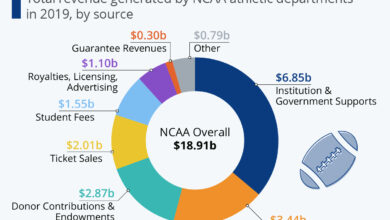Merit-based Scholarships For Athletes: Unlocking Opportunities For Student-Athletes
Merit-based scholarships for athletes pave the way for talented individuals to excel both academically and athletically, offering a unique chance to pursue their passions while securing a promising future. As this scholarship type gains prominence in the realm of sports and academics, it’s essential to delve into its intricacies to understand the transformative impact it has on aspiring athletes.
Merit-based scholarships for athletes
Merit-based scholarships for athletes are financial aid packages awarded to student-athletes based on their academic achievements, athletic abilities, and other non-financial criteria. These scholarships are typically offered by colleges, universities, athletic associations, and other organizations to support talented athletes in pursuing their education while continuing to excel in their sports.
Examples of organizations or institutions offering such scholarships
- NCAA (National Collegiate Athletic Association): The NCAA offers various merit-based scholarships to student-athletes participating in college sports programs.
- College athletic departments: Many colleges and universities provide merit-based scholarships to student-athletes who demonstrate exceptional academic and athletic performance.
- Private foundations and sports organizations: There are numerous private foundations and sports organizations that offer merit-based scholarships to support the educational pursuits of talented athletes.
Criteria typically used to determine eligibility for these scholarships
- Academic performance: Student-athletes are often required to maintain a certain GPA to be eligible for merit-based scholarships.
- Athletic achievements: Demonstrated excellence in sports, such as winning championships or receiving awards, can also play a significant role in determining eligibility.
- Leadership qualities: Some scholarships may take into account the student-athlete’s leadership skills, community involvement, and other extracurricular activities.
Comparison with need-based scholarships for athletes
- Merit-based scholarships are awarded based on the student-athlete’s academic and athletic achievements, while need-based scholarships consider the financial need of the student and their family.
- Merit-based scholarships focus on rewarding excellence and talent, regardless of financial circumstances, while need-based scholarships aim to provide financial assistance to students who require support to afford their education.
- Both types of scholarships play a crucial role in helping student-athletes pursue their academic and athletic goals, but they differ in the criteria used to determine eligibility and the purpose of the financial aid provided.
Benefits of merit-based scholarships
Receiving a merit-based scholarship as an athlete comes with numerous advantages that can positively impact both academic and athletic pursuits. These scholarships not only provide financial support but also recognition for the hard work and dedication athletes put into their sports.
Impact on Academic and Athletic Career
Merit-based scholarships can significantly impact an athlete’s academic and athletic career by easing the financial burden of pursuing higher education while also allowing them to continue training and competing at a high level. This balance helps athletes excel both in the classroom and on the field, leading to overall personal and professional growth.
Success Stories
Many athletes have benefited from merit-based scholarships, going on to achieve success in their respective sports and careers. For example, Olympic gold medalist Michael Phelps received a scholarship to the University of Michigan, where he continued to train and compete while earning his degree. This support played a crucial role in his journey to becoming one of the greatest swimmers of all time.
Long-Term Benefits
Receiving a merit-based scholarship can have long-term benefits for athletes, including increased opportunities for career advancement, networking, and personal development. By excelling in both academics and athletics, athletes set themselves up for success beyond their competitive years.
Comparison with Need-Based Scholarships
Merit-based scholarships are awarded based on the athlete’s achievements, skills, and potential, while need-based scholarships consider the financial need of the individual or family. Both types of scholarships provide valuable support, but merit-based scholarships specifically recognize and reward athletic excellence and academic achievement.
Improving Chances of Earning a Merit-Based Scholarship
Athletes can improve their chances of earning a merit-based scholarship by maintaining a strong academic record, excelling in their sport, actively seeking out scholarship opportunities, and building relationships with coaches and mentors who can provide guidance and support throughout the application process.
Role of Coaches and Mentors
Coaches and mentors play a crucial role in helping athletes secure merit-based scholarships by providing training, guidance, and recommendations that showcase the athlete’s skills and potential. Their support and mentorship can make a significant difference in the athlete’s scholarship application and overall success.
Importance of Extracurricular Activities
Engaging in extracurricular activities and community involvement can strengthen an athlete’s scholarship application by demonstrating leadership, teamwork, and a well-rounded personality. These experiences showcase the athlete’s ability to balance various responsibilities and contribute positively to their community, making them a more attractive candidate for merit-based scholarships.
Application process
When it comes to applying for merit-based scholarships for athletes, the process can vary depending on the specific scholarship program. Typically, athletes will need to demonstrate their academic achievements, athletic abilities, and overall potential to succeed in both areas.
Documentation and Evidence
To apply for these scholarships, athletes may be required to submit various documents and evidence, such as transcripts, letters of recommendation, athletic resumes, and personal statements. These documents help scholarship committees assess the athlete’s academic performance, character, and athletic achievements.
Interviews or Evaluations
In some cases, athletes may be asked to participate in interviews or evaluations as part of the application process. This allows scholarship committees to get to know the athlete better, understand their goals, and assess their potential for success in college and beyond.
Tips for Athletes
– Start early: Begin researching scholarship opportunities and gathering required documents well in advance of deadlines.
– Highlight achievements: Showcase your academic and athletic accomplishments in a clear and compelling way.
– Seek feedback: Ask teachers, coaches, or mentors to review your application materials and provide feedback for improvement.
– Be authentic: Stay true to yourself and your experiences in your application materials, and let your unique qualities shine through.
– Stay organized: Keep track of deadlines, requirements, and any additional steps in the application process to ensure you submit a complete and competitive application.
Ethical considerations
When it comes to merit-based scholarships for athletes, there are several ethical considerations that need to be taken into account. These scholarships can have a significant impact on the fairness of sports competitions and raise concerns about favoritism and bias in the selection process.
Potential Impact on Fairness of Sports Competitions
Merit-based scholarships for athletes can potentially tilt the playing field in favor of those who have access to better resources or opportunities. This can create an uneven competition where athletes from disadvantaged backgrounds may not have the same opportunities to excel.
Furthermore, if athletes who receive scholarships are not truly deserving based on their skills and abilities, it can undermine the integrity of the sport and diminish the value of hard work and dedication.
Concerns of Favoritism and Bias
There is a risk of favoritism and bias in awarding merit-based scholarships to athletes. Coaches or selection committees may show preferential treatment towards certain individuals based on personal relationships or other factors unrelated to merit.
This can lead to deserving athletes being overlooked in favor of those who have connections or influence within the selection process, casting doubt on the fairness and credibility of the scholarships.
Ensuring Transparency and Fairness
To address these ethical concerns, it is crucial to establish clear criteria for awarding merit-based scholarships and ensure transparency in the selection process. This can involve setting specific benchmarks for performance, conducting impartial evaluations, and involving multiple stakeholders in the decision-making process.
By implementing measures to promote fairness and accountability, such as independent oversight and regular audits, institutions can uphold the integrity of merit-based scholarships for athletes and maintain a level playing field for all participants.
Academic requirements
To be considered for merit-based scholarships as a student-athlete, meeting certain academic requirements is crucial. These requirements ensure that athletes can excel both in their sport and in the classroom, setting them up for success in their collegiate careers.
GPA requirements
In general, student-athletes seeking merit-based scholarships are expected to maintain a strong GPA throughout high school. While specific GPA requirements can vary depending on the scholarship and the college or university, a GPA of 3.0 or higher is often a common benchmark.
Role of standardized test scores
Standardized test scores, such as the SAT or ACT, play a significant role in the scholarship application process for athletes. These scores provide admissions committees with an additional measure of a student-athlete’s academic abilities and potential success in college. While not the sole determining factor, strong SAT or ACT scores can greatly enhance a student-athlete’s scholarship application.
Academic milestones and achievements
Apart from GPA and standardized test scores, academic milestones and achievements can also bolster an athlete’s scholarship application. These may include honors classes, AP courses, academic awards, or leadership roles in academic organizations. Highlighting these accomplishments can demonstrate a student-athlete’s dedication to academic excellence.
Importance of time management skills
Time management skills are essential for student-athletes to excel academically while balancing their sports commitments. By effectively managing their time, student-athletes can prioritize academics, attend practices and games, and still maintain a healthy work-life balance. Developing strong time management skills can make a significant difference in a student-athlete’s academic performance.
Comparison table of academic criteria
Below is a comparison table highlighting the academic criteria for different types of athletic scholarships, including Division I, Division II, and NAIA programs:
| Scholarship Type | GPA Requirement | Standardized Test Scores | Additional Academic Criteria |
|---|---|---|---|
| Division I | 3.0 or higher | SAT: 1000+, ACT: 20+ | Honors classes, AP courses |
| Division II | 2.5 or higher | SAT: 900+, ACT: 18+ | Academic awards, leadership roles |
| NAIA | 2.0 or higher | SAT: 860+, ACT: 16+ | Academic scholarships, research projects |
Retention Rates
Athletes who receive merit-based scholarships often have higher retention rates compared to non-scholarship athletes. This can be attributed to various factors that contribute to their success in maintaining their scholarships and staying in school.
Factors Contributing to High Retention Rates
- Athletes receiving merit-based scholarships tend to have a strong support system from coaches, teammates, and academic advisors, which helps them navigate academic and athletic challenges.
- These scholarships often come with academic requirements that promote good study habits and time management skills, leading to academic success.
- Being part of a collegiate sports team can provide a sense of community and belonging, reducing feelings of isolation and increasing motivation to stay in school.
Challenges in Maintaining Scholarships
- Injuries or performance-related issues can jeopardize an athlete’s scholarship, especially if they are unable to meet the athletic expectations set by the institution.
- Time constraints due to rigorous training schedules and travel commitments can make it challenging for athletes to balance academic responsibilities with their athletic pursuits.
- Changes in coaching staff or team dynamics can impact an athlete’s experience and potentially affect their ability to maintain their scholarship.
Recommendations for Scholarship Retention
- Prioritize academic success by seeking support from tutors, academic advisors, and professors to ensure you meet the required GPA for scholarship renewal.
- Communicate openly with coaches and academic advisors about any challenges you may be facing, whether academic or athletic, to proactively address issues that could impact your scholarship.
- Maintain a healthy balance between athletics and academics by creating a structured schedule that allows for dedicated time for both training and studying.
Impact on athletic programs
The impact of merit-based scholarships on college or university athletic programs is significant, influencing team dynamics, recruitment strategies, and overall performance. These scholarships play a crucial role in elevating the status of athletic programs and can lead to notable achievements and recognition. Let’s delve deeper into how these scholarships affect athletic programs.
Effect on Team Dynamics and Morale
Merit-based scholarships can have both positive and negative effects on team dynamics and morale. While scholarship recipients may receive special attention or treatment, leading to jealousy or resentment among teammates, they can also serve as role models and inspire others to work harder. It is essential for coaches and team leaders to foster a sense of unity and collaboration among all team members to maintain a positive team environment.
Recruitment Strategies for Sports Teams
Athletic programs offering merit-based scholarships often target specific positions or skill sets to strengthen their teams. By providing scholarships to talented athletes, schools can attract top-tier recruits and enhance their competitiveness in various sports. Coaches strategically scout and recruit athletes who align with the team’s goals and playing style to ensure success on the field or court.
Performance and Success of Athletic Programs
Analyzing the performance and success of athletic programs with merit-based scholarship recipients involves comparing statistics such as win-loss records, player development, and team rankings. Scholarship recipients may contribute significantly to the team’s success by excelling in their respective sports and elevating the overall performance of the program. By investing in talented student-athletes, schools can achieve greater success and recognition in the sports community.
Elevating the Status of Athletic Programs
Merit-based scholarships have the potential to elevate the status of athletic programs by showcasing the talent and dedication of scholarship recipients. These athletes can bring about notable achievements and recognition to their respective teams, putting them on the map in the competitive world of college sports. By highlighting the success stories of scholarship recipients, schools can attract more talented athletes and improve their overall standing in the sports arena.
Comparative Analysis
A comparative analysis between athletic programs that offer merit-based scholarships and those that do not can reveal differences in player motivation, team cohesion, and competitiveness. Programs with scholarships may have a competitive edge due to the recruitment of top athletes, leading to higher performance levels and better team cohesion. On the other hand, programs without scholarships may struggle to attract top talent and maintain competitiveness in their respective sports.
Maximizing the Impact of Merit-Based Scholarships
To maximize the impact of merit-based scholarships on athletic programs, schools should consider factors such as funding allocation, eligibility criteria, and ongoing support for student-athletes. By investing in the right athletes and providing them with the necessary resources and support, schools can enhance the overall performance and success of their athletic programs. This proactive approach can lead to greater achievements and recognition in the sports community.
Diversity and inclusion
Merit-based scholarships play a crucial role in promoting diversity and inclusion in sports by providing opportunities for athletes from underrepresented backgrounds to pursue their academic and athletic goals.
Initiatives to increase access
- Establishing outreach programs to connect with athletes in underserved communities.
- Partnering with community organizations to identify and support talented athletes from diverse backgrounds.
- Providing resources for standardized test preparation and academic support to level the playing field.
Impact of diverse scholarship recipients
- Diverse scholarship recipients bring unique perspectives and experiences to team dynamics, fostering a culture of inclusion and understanding.
- Increased diversity has been linked to improved team performance and cohesion, leading to greater success on and off the field.
- Success stories of diverse athletes who have excelled with merit-based scholarships highlight the positive impact of inclusion in sports.
Application process comparison
- The application process for merit-based scholarships can vary across different sports, with some requiring athletic performance evaluations and others focusing more on academic achievements.
- Understanding the specific requirements for each sport can help athletes from diverse backgrounds navigate the application process more effectively.
Establishing equitable selection criteria
- Sports organizations can create equitable selection criteria by considering a combination of academic performance, athletic achievements, and personal background.
- Implementing blind application reviews can help minimize bias and ensure fair evaluation of all applicants, regardless of their background.
Mentorship programs for support
- Establishing mentorship programs can provide scholarship recipients from diverse backgrounds with guidance and support to navigate challenges and maximize their potential.
- Mentors can offer valuable insights, advice, and networking opportunities to help athletes succeed both academically and athletically.
Long-term effects on career trajectory
- Receiving a merit-based scholarship can have long-lasting effects on the career trajectory of athletes from underrepresented groups, opening doors to opportunities they may not have had access to otherwise.
- Successful scholarship recipients can serve as role models and inspire future generations of diverse athletes to pursue their dreams and excel in sports.
Alumni contributions
Alumni who received merit-based scholarships often feel a strong connection to their alma mater’s athletic programs and are motivated to give back in various ways. This culture of giving is essential for the continued success and growth of athletic programs.
Financial Support
Many alumni contribute financially to their former athletic programs, providing funds for equipment, facilities, travel expenses, and other necessities. These contributions help ensure that current athletes have the resources they need to succeed.
Mentorship and Guidance
Some alumni choose to support current athletes through mentorship programs, offering guidance, advice, and support to help them navigate the challenges of balancing academics and athletics. This mentorship can make a significant impact on the personal and professional development of student-athletes.
Impactful Alumni
- Example 1: John Smith, a former scholarship recipient, donated a substantial amount to upgrade the training facilities at his alma mater, leading to improved performance and recruitment of top-tier athletes.
- Example 2: Sarah Johnson, a successful entrepreneur and former athlete, established a scholarship fund to help student-athletes pursue their academic and athletic goals simultaneously.
Career opportunities
Merit-based scholarships for athletes offer more than just financial support for their education; they also pave the way for diverse career opportunities beyond the realm of sports. Athletes who receive these scholarships develop transferable skills that are highly valued in various professional fields, allowing them to excel beyond their athletic careers.
Transferable Skills
- Athletes hone essential skills such as leadership, teamwork, time management, and resilience throughout their scholarship experience.
- These skills are transferable to a wide range of professions, making scholarship recipients highly sought-after candidates in the job market.
Success Stories
- Many scholarship recipients leverage their athletic background to pursue successful careers in fields such as business, law, healthcare, and education.
- Examples include former athletes who have transitioned into roles as CEOs, lawyers, doctors, teachers, and entrepreneurs, showcasing the versatility of their scholarship experience.
Professional Development
- Athletes who receive scholarships often have access to valuable networking opportunities and mentorship, which help them explore diverse career paths post-athletics.
- Continued education or professional development is crucial for athletes after their scholarship ends to stay competitive in their chosen fields.
Employer Perspective
- Companies highly value the leadership and teamwork skills acquired by athletes through scholarships, making them attractive candidates during the recruitment process.
- Athletes can effectively showcase their scholarship experience on resumes and during job interviews by highlighting their achievements, skills, and personal growth throughout their athletic journey.
Impact on mental health
Receiving a merit-based scholarship can have a significant impact on an athlete’s mental health, both positively and negatively. It is essential to understand the pressures and expectations that scholarship recipients may face and provide strategies for maintaining a healthy work-life balance while benefiting from scholarships.
Pressures and Expectations
- Scholarship recipients may feel the pressure to excel both academically and athletically to maintain their scholarships.
- Expectations from coaches, teammates, and even themselves can create stress and anxiety.
- Striking a balance between training, competitions, schoolwork, and social life can be overwhelming.
Strategies for Balance
- Establishing clear priorities and setting realistic goals can help athletes manage their time effectively.
- Practicing mindfulness, meditation, or seeking professional help can support mental well-being.
- Engaging in hobbies, social activities, and restful breaks can prevent burnout and enhance overall happiness.
Support Resources
- Many universities offer counseling services, mental health programs, and sports psychologists to assist student-athletes.
- Online platforms, support groups, and peer mentoring can provide additional guidance and encouragement.
- Open communication with coaches and mentors facilitates early intervention and support for mental health challenges.
Fear of Losing Scholarship
- The fear of losing a scholarship can lead to increased stress, performance anxiety, and self-doubt among athletes.
- Creating a backup plan, focusing on personal growth, and seeking alternative financial aid options can alleviate this fear.
- Building resilience, self-confidence, and a strong support network can help athletes navigate uncertainties.
Personalized Mental Health Plan
- Identify triggers, stressors, and coping mechanisms specific to individual needs and circumstances.
- Set realistic expectations, boundaries, and self-care routines to maintain mental well-being.
- Regularly evaluate and adjust the mental health plan based on feedback, experiences, and changing circumstances.
Governing bodies and regulations
The role of governing bodies in overseeing the distribution of merit-based scholarships for athletes is crucial to ensure fairness and compliance with regulations. These bodies set guidelines and monitor the allocation of scholarships to ensure that they are awarded based on merit and not influenced by external factors.
Regulations and Policies
- Governing bodies establish clear regulations and policies that institutions must follow when awarding merit-based scholarships to athletes. These guidelines outline the criteria for eligibility, the selection process, and the amount of financial aid that can be awarded.
- Institutions are required to demonstrate transparency in their scholarship allocation process and adhere to the rules set forth by the governing bodies. This helps prevent any bias or favoritism in awarding scholarships.
- Regulations may also include provisions for monitoring the academic performance and progress of student-athletes who receive merit-based scholarships to ensure they are meeting the required standards.
Controversies and Challenges
- One of the challenges related to governing bodies’ oversight of scholarship programs is the potential for loopholes or inconsistencies in the enforcement of regulations. This can lead to disputes or controversies regarding the fairness of scholarship allocations.
- Controversies may arise if there are allegations of preferential treatment or violations of the established policies in awarding scholarships to athletes. It is essential for governing bodies to address any issues promptly and ensure accountability.
Enhancing Transparency and Accountability
- To enhance transparency and accountability in scholarship allocation, governing bodies can implement regular audits and reviews of institutions’ scholarship programs. This helps identify any irregularities or discrepancies in the distribution of scholarships.
- Providing training and guidance to institutions on best practices for awarding merit-based scholarships can also improve compliance with regulations and promote fairness in the process.
- Governing bodies can establish channels for reporting any concerns or violations related to scholarship allocations, allowing for timely investigation and resolution of issues.
Future trends
As the landscape of merit-based scholarships for athletes continues to evolve, there are several trends to anticipate in the coming years. These trends are influenced by external factors such as technology advancements and societal changes, which play a significant role in shaping scholarship offerings and criteria for awarding scholarships.
Impact of Globalization
Globalization is expected to have a profound impact on the availability and competitiveness of athletic scholarships. With the world becoming more interconnected, athletes from diverse backgrounds and regions will have increased access to scholarship opportunities. This could lead to a more competitive selection process and higher standards for receiving scholarships.
Role of Data Analytics
Data analytics is likely to play a key role in shaping the distribution of athletic scholarships in the future. By leveraging data and analytics tools, institutions can better evaluate the performance and potential of athletes, leading to more informed decisions in awarding scholarships. This trend may result in a more data-driven and objective approach to scholarship selection.
Social Media Presence
The influence of social media presence on athletes’ chances of securing scholarships is expected to grow. As social media platforms continue to be a prominent tool for showcasing talent and connecting with audiences, athletes who actively build their online presence may have an advantage in attracting scholarship opportunities. Institutions may increasingly consider an athlete’s social media activity as part of the selection process.
Specialized Scholarships
There may be a rise in specialized scholarships for niche sports or talents within the athletic community. As institutions seek to support a wider range of athletic endeavors and recognize unique skills and achievements, we may see an increase in scholarships tailored to specific sports or talents. This trend could create more opportunities for athletes with specialized interests and abilities.
Closing Summary
In conclusion, Merit-based scholarships for athletes stand as a beacon of hope and opportunity for those striving to reach new heights in their academic and athletic pursuits. By exploring the nuances of this scholarship category, individuals can harness its potential to shape a successful and fulfilling future in the realm of sports and education.









